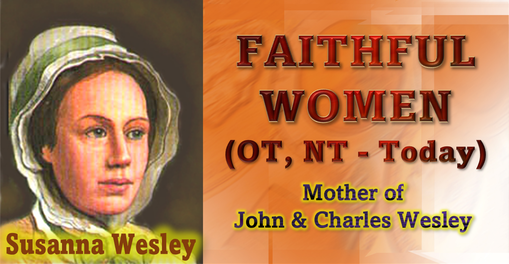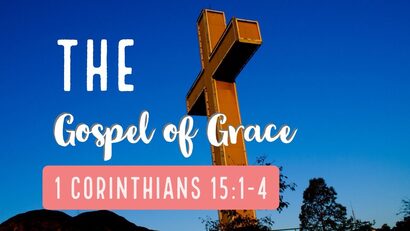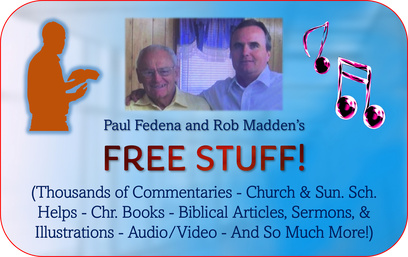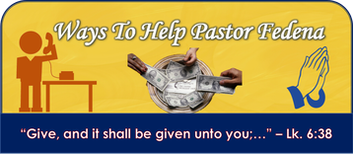FAITHFUL WOMEN
(OT, NT - Today)
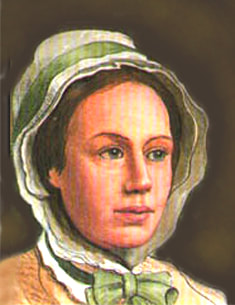 Susanna Wesley
Susanna Wesley
The ministry of women has been from Bible times and still moves on today,
Examples:
The book of Acts 2:17-18 and the book of Joel 2:28-29 tell us: "In the last days God will pour out His Spirit upon all flesh. Your sons and daughters shall prophesy, menservants and maidservants shall prophesy." According to some Bible theologians the word "prophesy" means to preach the word of God, and to other theologians it's to proclaim a message directly from God. Whenever one gave a prophesy, it was always a message to a group of people or an individual.
In Luke 2:36-38, Anna was 84 years old when she gave her historic prophecy regarding Jesus to everyone that was in the temple. The name Anna means "Favor" or "Grace." God revealed the Messiah, the Hope of the world, to this elderly lady and she spoke it to all that were near.
In Acts 21:9, Philip the Evangelist had four unmarried daughters who prophesied.
Romans 16:1 tells us of Phoebe. Her name means "Pure" or "Radiant as the moon." Paul addressed her as a servant and helper of the church. In some Bible translations she is called a deaconess and other translations consider her to be a minister. According to many Bible scholars, Phoebe was the one who carried the written book of Romans to the congregation, probably from Corinth to Rome. This would declare a place for women in the sharing of the word of God to the world.
Judges 4:4-5, Deborah was a Spirit-filled, multitalented woman. Her name means "Honey Bee." She was wise and shared with her friends. Her influence and authority was used by God to bring victory to her people Israel. God had given her talent and leadership ability. She was a song writer and sang as well. She was a true woman of God who judged or led Israel for 40 years.
The reason Deborah was so effective in her ministry is because of her spiritual commitment and walk with God. She was also called a Prophetess.
Susanna Wesley mother of John and Charles Wesley, while her husband was absent in London in 1711, attending Convocation, Mrs. Wesley adopted the practice of reading in her family, and instructing them. One of the servants told his parents and they wished to come. These told others, and they came, till the congregations amounted to forty, and increased till they were over two hundred, and the parsonage could not contain all that came. She read to them the best and most awakening sermons she could find in the library, talked to the people freely and affectionately. There meetings were held "because she thought the end of the institution of the Sabbath was not fully answered by attending Church unless the intermediate spaces of time were filled up by other acts of devotion."
Inman, the Curate, was a very ignorant and narrow man. He became jealous because her audience was larger than his, and he wrote to Mr. Wesley, complaining that his wife, in his absence, had turned the parsonage into a conventicle; that the Church was likely to be scandalized by such irregular proceedings; and that they ought to be tolerated no longer. Mr. Wesley wrote to his wife that she should get some one else to read the sermons. She replied that there was not a man there who could read a sermon without spoiling it.
Inman, the Curate, still complained, and the Rector wrote to Mrs. Wesley that the meetings should be discontinued. Mrs. Wesley answered him by showing what good the meetings had done, and that none were opposed to them but Mr. Inman and one other. She then concludes with these wonderful sentences: "If after all this you think fit to dissolve this assembly do not tell me you desire me to do it, for that will not satisfy my conscience; but send your positive command in such full and express terms as may absolve me from all guilt and punishment for neglecting this opportunity for doing good when you and I shall appear before the great and awful tribunal of our Lord Jesus Christ.
Were not these the first Methodist meetings held by the Wesleys?
Can we wonder that Isaac Taylor says that "the mother of the Wesleys was the mother of Methodism;" and that in her characteristic letter, when she said, "'Do not advise me, but command me to desist,'" she was bringing to its place a corner-stone of the future of Methodism."
Who can tell the influence those meetings of their mother in the parsonage had upon John and Charles in future years, who were then little boys, and always present!
Today many Christian women are carrying the Gospel to the world. Some religious folks say women are not to speak in church or to men about God, but from the Biblical record women have always spoken. If women are not allowed to speak to men about God, then what does one do with John 20:11-18; Jesus appeared to Mary Magdalene and told her to go tell his brothers. And Matthew 29:9-10; the women went to tell the brothers about Jesus.
God said through Joel, "In the last day I will pour out my Spirit upon all flesh and your sons and daughters shall prophecy." How can one not help recognize what God wants to do in His church through men and women today? The gifts are for the body of Christ and the Holy Spirit is the giver of those gifts to whomever will receive them. Male or female - when truly filled with the Holy Spirit and used by Him - they will give all the glory to the Father and the Son. He shall use them in mighty ways because He is fulfilling His word. "I will pour out my Spirit upon all flesh and they shall prophesy."
Examples:
The book of Acts 2:17-18 and the book of Joel 2:28-29 tell us: "In the last days God will pour out His Spirit upon all flesh. Your sons and daughters shall prophesy, menservants and maidservants shall prophesy." According to some Bible theologians the word "prophesy" means to preach the word of God, and to other theologians it's to proclaim a message directly from God. Whenever one gave a prophesy, it was always a message to a group of people or an individual.
In Luke 2:36-38, Anna was 84 years old when she gave her historic prophecy regarding Jesus to everyone that was in the temple. The name Anna means "Favor" or "Grace." God revealed the Messiah, the Hope of the world, to this elderly lady and she spoke it to all that were near.
In Acts 21:9, Philip the Evangelist had four unmarried daughters who prophesied.
Romans 16:1 tells us of Phoebe. Her name means "Pure" or "Radiant as the moon." Paul addressed her as a servant and helper of the church. In some Bible translations she is called a deaconess and other translations consider her to be a minister. According to many Bible scholars, Phoebe was the one who carried the written book of Romans to the congregation, probably from Corinth to Rome. This would declare a place for women in the sharing of the word of God to the world.
Judges 4:4-5, Deborah was a Spirit-filled, multitalented woman. Her name means "Honey Bee." She was wise and shared with her friends. Her influence and authority was used by God to bring victory to her people Israel. God had given her talent and leadership ability. She was a song writer and sang as well. She was a true woman of God who judged or led Israel for 40 years.
The reason Deborah was so effective in her ministry is because of her spiritual commitment and walk with God. She was also called a Prophetess.
Susanna Wesley mother of John and Charles Wesley, while her husband was absent in London in 1711, attending Convocation, Mrs. Wesley adopted the practice of reading in her family, and instructing them. One of the servants told his parents and they wished to come. These told others, and they came, till the congregations amounted to forty, and increased till they were over two hundred, and the parsonage could not contain all that came. She read to them the best and most awakening sermons she could find in the library, talked to the people freely and affectionately. There meetings were held "because she thought the end of the institution of the Sabbath was not fully answered by attending Church unless the intermediate spaces of time were filled up by other acts of devotion."
Inman, the Curate, was a very ignorant and narrow man. He became jealous because her audience was larger than his, and he wrote to Mr. Wesley, complaining that his wife, in his absence, had turned the parsonage into a conventicle; that the Church was likely to be scandalized by such irregular proceedings; and that they ought to be tolerated no longer. Mr. Wesley wrote to his wife that she should get some one else to read the sermons. She replied that there was not a man there who could read a sermon without spoiling it.
Inman, the Curate, still complained, and the Rector wrote to Mrs. Wesley that the meetings should be discontinued. Mrs. Wesley answered him by showing what good the meetings had done, and that none were opposed to them but Mr. Inman and one other. She then concludes with these wonderful sentences: "If after all this you think fit to dissolve this assembly do not tell me you desire me to do it, for that will not satisfy my conscience; but send your positive command in such full and express terms as may absolve me from all guilt and punishment for neglecting this opportunity for doing good when you and I shall appear before the great and awful tribunal of our Lord Jesus Christ.
Were not these the first Methodist meetings held by the Wesleys?
Can we wonder that Isaac Taylor says that "the mother of the Wesleys was the mother of Methodism;" and that in her characteristic letter, when she said, "'Do not advise me, but command me to desist,'" she was bringing to its place a corner-stone of the future of Methodism."
Who can tell the influence those meetings of their mother in the parsonage had upon John and Charles in future years, who were then little boys, and always present!
Today many Christian women are carrying the Gospel to the world. Some religious folks say women are not to speak in church or to men about God, but from the Biblical record women have always spoken. If women are not allowed to speak to men about God, then what does one do with John 20:11-18; Jesus appeared to Mary Magdalene and told her to go tell his brothers. And Matthew 29:9-10; the women went to tell the brothers about Jesus.
God said through Joel, "In the last day I will pour out my Spirit upon all flesh and your sons and daughters shall prophecy." How can one not help recognize what God wants to do in His church through men and women today? The gifts are for the body of Christ and the Holy Spirit is the giver of those gifts to whomever will receive them. Male or female - when truly filled with the Holy Spirit and used by Him - they will give all the glory to the Father and the Son. He shall use them in mighty ways because He is fulfilling His word. "I will pour out my Spirit upon all flesh and they shall prophesy."
Susanna Wesley (1659-1742)
1. Mothers and Christian Women
2. GOD PORTRAYS WOMEN by Grace McAllister - Part One and Two
3. THE ROLE OF WOMEN IN A BAPTIST CHURCH - Dr. Paul Fedena
4. Christian Biographies and Personal Testimonies of Famous Men and Women of God
5. "SISTERS” or (WOMEN IN THE CHURCH) - Romans 16:1,2 - Dr. Paul Fedena
6. “FEMALES, GIRLS, WOMEN, LADIES, WIVES and MOTHERS...” - Dr. Fedena
7. GOD IS LOOKING FOR A FEW ‘GOOD’ MEN (& WOMEN) - Dr. Paul Fedena
8. MOTHERS FOR THE NEW MILLENNIUM
9. Susanna Wesley (1659-1742)
Well done, thou good and faithful servant:
1. Christian Biographies
2. Great Preachers and Their Biographies
3. FAITHFUL WOMEN (OT, NT - Today)
4. Biography of William Carey 1761-1834
5. 50 People Every Christian Should Know Learning from Spiritual Giants of the Faith
6. Echoes from Glory: Selective Sayings ...being dead yet speaketh.
7. Hymn Writers and Composers
8. More Biographies
2. Great Preachers and Their Biographies
3. FAITHFUL WOMEN (OT, NT - Today)
4. Biography of William Carey 1761-1834
5. 50 People Every Christian Should Know Learning from Spiritual Giants of the Faith
6. Echoes from Glory: Selective Sayings ...being dead yet speaketh.
7. Hymn Writers and Composers
8. More Biographies

